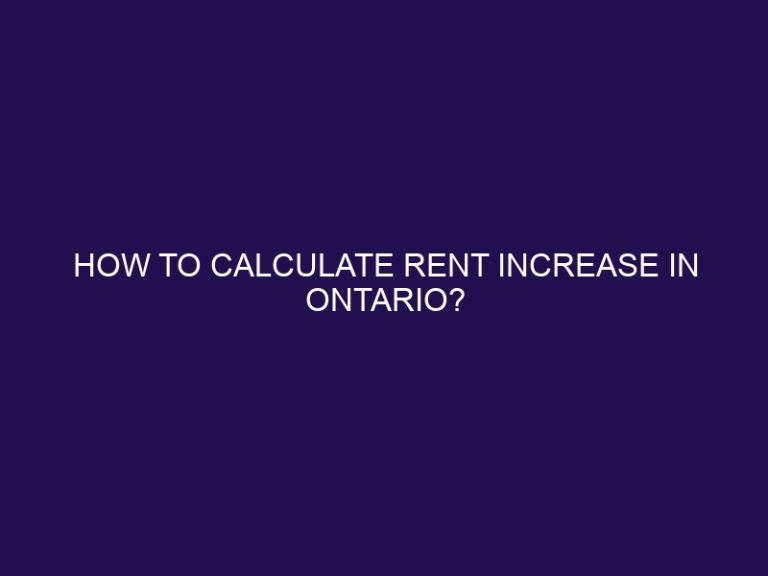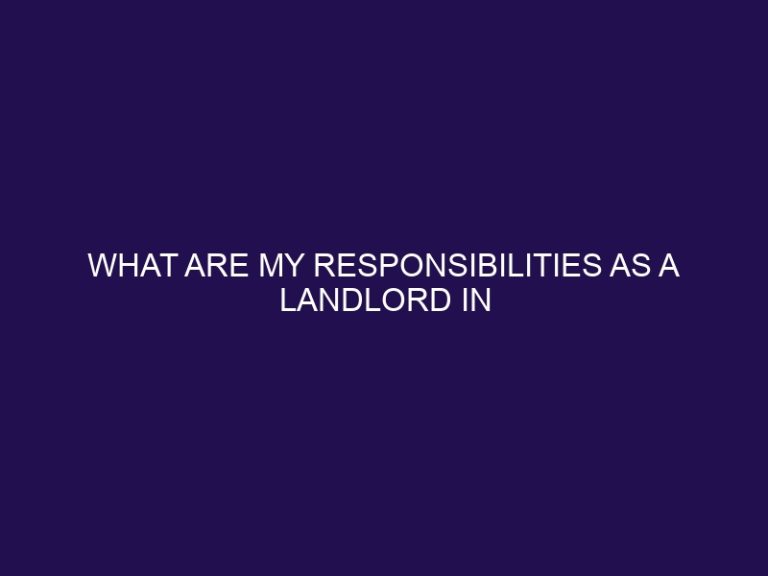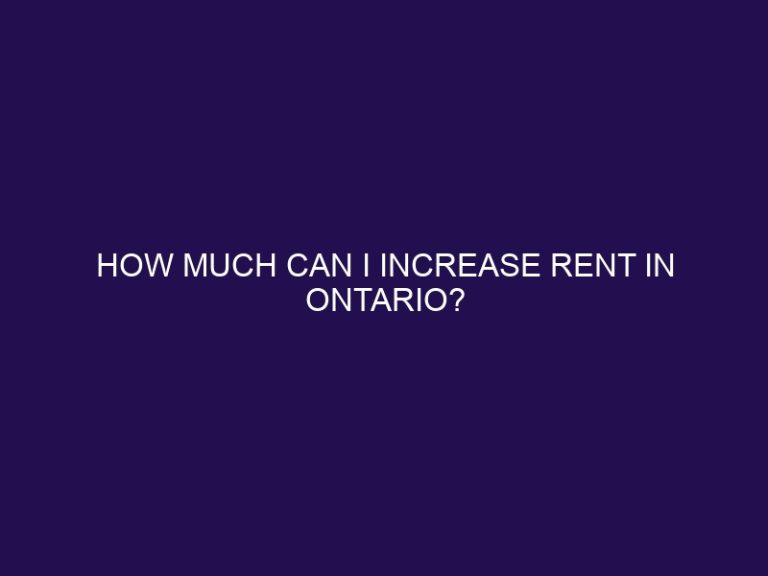How much can I increase rent in British Columbia?
.jpg)
Determining how much rent can be increased in British Columbia is an important consideration for both landlords and tenants. Rent increase guidelines and regulations exist to ensure fair and reasonable practices are followed. Understanding these guidelines is crucial to maintaining a balanced and healthy rental market.
In British Columbia, there are specific rent increase limits set by the Residential Tenancy Branch. The limits are usually determined annually and are based on the province’s inflation rate. However, it’s important to note that these limits may vary from year to year, so it’s necessary to stay up-to-date with the current regulations.
While there are rent increase limits in place, there are exceptions as well. For instance, if a property undergoes significant renovations or repairs, landlords may be permitted to increase rent beyond the allowed limit. It’s important to familiarize yourself with these exceptions to ensure compliance with the regulations.
Various factors need to be considered when determining rent increases. Factors such as municipal rent control measures, current market conditions, property maintenance and upgrades, and the cost of living are all vital in making informed decisions regarding rent adjustments.
In order to implement a rent increase, specific notice requirements must be followed. Landlords are required to provide proper notice to tenants before increasing the rent. The length of notice will depend on the type of tenancy and the percentage of the rent increase. Understanding and adhering to the notice requirements is essential to avoid any potential legal issues.
Calculating rent increases involves a systematic approach. The annual rent increase calculation is based on the guidelines set by the Residential Tenancy Branch. There may be provisions for additional rent increases due to capital improvements or extraordinary expenses incurred by the landlord. Following the proper calculation methods ensures transparency and fairness in the rental process.
Lastly, it’s important to be aware of tenant rights and available resources. Tenants have certain rights when it comes to rent increases, and understanding these rights can empower them to make informed decisions and protect their interests. There are various resources available, such as tenant advocacy groups and government agencies, that offer guidance and support to tenants facing rent increases.
By being knowledgeable about the rent increase guidelines, notice requirements, calculation methods, and tenant rights, both landlords and tenants can navigate the rental market in British Columbia more effectively and ensure a fair and balanced approach to renting properties.
Key Takeaways:
- Rent increase limits in British Columbia: There are guidelines that restrict the amount landlords can increase rent each year to protect tenants from excessive hikes.
- Factors affecting rent increases: Municipal rent control, market conditions, property maintenance and upgrades, and the cost of living all play a role in determining the amount landlords can increase rent.
- Notice requirements and calculations: Landlords must provide sufficient notice to tenants before increasing rent, and certain calculations must be used to determine the allowable amount for rent increases.
Rent Increase Guidelines in British Columbia
Rent increase guidelines in British Columbia provide specific regulations on how much landlords can raise the rent for residential tenancies. As of 2021, the annual allowable rent increase, according to the rent increase guidelines in British Columbia, is determined by the provincial government and is tied to the Consumer Price Index. For example, in 2021, the allowable rent increase, set by the rent increase guidelines in British Columbia, was 1.4%. Certain circumstances, outlined in the rent increase guidelines in British Columbia, may permit additional increases, such as for properties with substantial renovations. It’s important for both landlords and tenants to familiarize themselves with the rent increase guidelines in British Columbia to ensure compliance and avoid any disputes.
In a similar vein, a notable historical event regarding rent increase guidelines in British Columbia occurred in 2018. At that time, the provincial government implemented new legislation, based on the rent increase guidelines in British Columbia, that capped annual rent increases at the rate of inflation plus 2%. This measure, derived from the rent increase guidelines in British Columbia, aimed to address the affordability crisis in the rental market and prevent drastic rent hikes. It provided stability and protection for tenants while still allowing landlords to adjust rents accordingly within reasonable limits. This example highlights the significance of rent increase regulations, as outlined in the rent increase guidelines in British Columbia, in ensuring fair and reasonable rental practices.
What Are the Rent Increase Limits in British Columbia?
Rent increase limits in British Columbia are governed by regulations that protect tenants from excessive rental hikes. What are the rent increase limits in British Columbia? According to these rules, landlords are permitted to increase rent by a set percentage each year. As of 2021, the maximum allowable increase is 1.4%. Landlords must provide proper notice to tenants at least three full months before the increase takes effect. It’s important to note that these limits may not apply in cases where a rental unit is significantly renovated or if it is sold to a new owner. Understanding the rent increase limits ensures tenants are aware of their rights and can plan their finances accordingly.
Is There Any Exception to the Rent Increase Limits?
Is There Any Exception to the Rent Increase Limits?
In British Columbia, there are some exceptions to the rent increase limits. Landlords can apply for an additional rent increase above the standard limit in certain situations. These exceptions include:
| 1. Major capital improvements: | Is there any exception to the rent increase limits? Yes, landlords can request an additional rent increase if they have made major renovations or improvements to the rental property that significantly enhance its value or extend its lifespan. |
| 2. Extraordinary expenses: | Is there any exception to the rent increase limits? Yes, if landlords have incurred unforeseen and extraordinary expenses related to the maintenance or repair of the rental property, they may be allowed to apply for a rent increase to cover these costs. |
Pro-Tip: It is important for both landlords and tenants to familiarize themselves with the specific rules and regulations regarding rent increase exceptions in British Columbia to ensure compliance and fairness.
Factors to Consider for Rent Increases
Considering factors such as Municipal Rent Control, Market Conditions, Property Maintenance and Upgrades, and Cost of Living, this section delves into what landlords need to think about when considering rent increases in British Columbia. Learn how these elements play a crucial role in determining the appropriate amount to raise rent, ensuring a fair and sustainable approach for both tenants and property owners.
Municipal Rent Control
Municipal rent control is a crucial consideration in discussions on rent increases in British Columbia. In this province, local governments possess the authority to establish their own regulations in order to safeguard tenants from exorbitant rent escalations. With municipal rent control, landlords may face limitations on the annual rent hike, ensuring that it remains within tenants’ reach. These regulations play a vital role in preserving housing affordability and preventing displacement in areas where demand is high. By incorporating municipal rent control, local governments prioritize the well-being of their residents and demonstrate support for affordable housing initiatives.
Market Conditions
Market conditions play a vital role in determining rent increases in British Columbia. It is crucial for landlords to assess the current rental market to determine the appropriateness of a rent increase. Several factors need to be considered:
| 1. Vacancy Rates | Low vacancy rates indicate a high demand for rental properties, providing landlords with more leverage to increase rents. |
| 2. Rental Rates | It is essential to analyze the rental rates in your area to ensure that your proposed increase aligns with the market average. |
| 3. Property Location and Condition | The location and condition of your property can affect its marketability and rental value. |
| 4. Local Economic Conditions | Factors such as job growth, inflation, and overall economic stability should be considered as they can influence housing demand and rental rates. |
By considering market conditions, landlords can make informed decisions regarding rent increases in British Columbia.
Property Maintenance and Upgrades
Property maintenance and upgrades are crucial when it comes to rent increases in British Columbia. Landlords are permitted to raise rents in order to cover the expenses of necessary property maintenance and improvements. Here are some essential points to consider regarding this topic:
Cost of Living
The cost of living is a crucial aspect to consider when determining rent increases in British Columbia. The escalating costs of everyday essentials such as groceries and utilities can greatly impact tenants’ affordability to pay higher rents. Landlords must take this factor into consideration in order to ensure that rent increases remain fair and reasonable. By taking into account the cost of living, landlords can find a balance between maintaining the value of their property and ensuring that it remains affordable for tenants. This, in turn, contributes to the development of a more stable and sustainable rental market in British Columbia.
Notice Requirements for Rent Increases
To ensure compliance with notice requirements for rent increases in British Columbia, landlords must follow specific steps. Here is the process to be followed:
Fact: In British Columbia, landlords are typically allowed to increase rent only once per year, as outlined by the notice requirements for rent increases.
How Much Notice Should I Give to Tenants?
When considering rent increases in British Columbia, it is important to know how much notice should be given to tenants. According to the rules, landlords must provide tenants with a written notice of a rent increase at least three months in advance. How much notice should I give to tenants, you might ask? Well, this notice must include the new rental amount and the date it will come into effect. It is crucial to adhere to these notice requirements to ensure a smooth and legal rent increase process.
What Are the Rules for Serving a Rent Increase Notice?
What Are the Rules for Serving a Rent Increase Notice?
When it comes to serving a rent increase notice in British Columbia, it is crucial to adhere to specific rules and guidelines in order to ensure compliance and safeguard the rights of both landlords and tenants. To properly serve a rent increase notice, follow these steps:
-
First and foremost, determine the allowable rent increase percentage based on the current regulations.
-
Next, prepare a written notice clearly stating the intention to increase the rent.
-
Ensure that the notice includes the effective date of the rent increase as well as the new rental amount.
-
Provide the tenant with the notice at least three months prior to the effective date of the rent increase.
-
Choose an accepted delivery method such as in-person, by mail, or by email (as mutually agreed upon with the tenant) to deliver the notice.
-
Retain a copy of the notice and any delivery receipts or communication records for future reference.
-
Make sure that the notice encompasses all required information and is presented in a clear and concise manner.
How to Calculate Rent Increases
Calculating rent increases can be a complex task, but fear not! We’ve got you covered. In this section, we’ll break down the process step by step, demystifying annual rent increase calculations, exploring additional rent increases for capital improvements, discussing rent increases for extraordinary expenses, and highlighting tenant rights and resources. By the end, you’ll have a clear understanding of how to navigate the intricacies of determining rent increases in British Columbia. So, let’s dive in and crunch those numbers!
Annual Rent Increase Calculation
Annual Rent Increase Calculation
Calculating the annual rent increase in British Columbia involves following a specific set of steps.
- Determine the allowable rent increase percentage set by the Residential Tenancy Branch, which is typically based on the inflation rate.
- Add any additional rent increases allowed for capital improvements or extraordinary expenses.
- Multiply the current rent amount by the allowable increase percentage.
- Add any additional rent increases to the calculated amount.
- Round the final amount to the nearest dollar.
- Provide the tenant with proper notice of the rent increase as required by law.
By following these steps, landlords can accurately calculate the annual rent increase for their properties in compliance with British Columbia’s regulations.
Additional Rent Increases for Capital Improvements
| Factors to Consider | Explanation |
| 1. Type of Improvement | Different types of capital improvements may contribute to the value or functionality of the rental property. |
| 2. Cost of Improvement | The total cost of the capital improvement will be a factor in determining the additional rent increases for capital improvements. |
| 3. Length of Improvement | If the improvement provides long-term benefits, a higher increase may be justified for additional rent increases for capital improvements. |
| 4. Impact on Tenant | If the improvement directly benefits the tenant, it may justify a higher rent increase for additional rent increases for capital improvements. |
| 5. Local Regulations | Check with local regulations to ensure compliance and determine any limitations on rent increases for capital improvements. |
Rent Increases for Extraordinary Expenses
- When seeking rent increases for extraordinary expenses, landlords in British Columbia must follow certain guidelines and procedures.
- The first step is to document all extraordinary expenses incurred for property maintenance or upgrades.
- Afterwards, calculate the total amount of these expenses.
- It is important to ensure that the expenses meet the criteria defined by the Residential Tenancy Branch as extraordinary.
- Next, prepare a written notice to inform the tenants about the upcoming rent increase specifically for extraordinary expenses.
- This notice should include a breakdown of the expenses and explain how the increase will be distributed among the tenants.
- Provide the notice to the tenants within the required notice period according to the regulations.
- Additionally, give tenants the opportunity to dispute the rent increase if they believe it is not justified.
- Lastly, make sure to keep records of all communication and documentation related to the rent increase.
Remember to consult legal resources and guidelines to ensure compliance with the specific rules and regulations in British Columbia.
Tenant Rights and Resources
Tenant Rights and Resources are paramount when it comes to maneuvering through rent increases in British Columbia. It’s crucial for tenants to be cognizant of their rights and have access to necessary resources that can aid them during this process.
Tenant Rights Regarding Rent Increases: Tenants retain the right to receive appropriate notice for rent increases and to challenge unjustified increases. Additionally, they possess the right to dispute rent increases if they deem them unreasonable or not in accordance with the law.
Resources for Tenants Facing Rent Increases: There are numerous resources available to tenants, including tenant organizations and legal aid clinics, which can furnish information, guidance, and support when confronting rent increases.
Pro-tip: Stay informed about your rights and actively seek assistance from tenant organizations or legal experts to ensure that you are safeguarded and well-informed throughout the rent increase process.
Tenant Rights Regarding Rent Increases
Tenant Rights Regarding Rent Increases
When it comes to rent increases, tenants in British Columbia have certain rights that protect them. These rights, known as tenant rights regarding rent increases, include:
| 1. Rent Increase Limits: | Landlords are only allowed to increase rent by a certain percentage each year, as determined by the Residential Tenancy Branch. |
| 2. Notice Requirements: | Landlords must provide proper notice to tenants before increasing rent, usually three months in advance. |
| 3. Tenant Resources: | Tenants have access to resources and information regarding their rights and options when facing rent increases. |
It is important for tenants to understand their rights and seek advice if they believe their landlord is not following the proper procedures. Historical data has shown that tenant advocacy and support have played a significant role in maintaining affordable housing and preventing excessive rent increases.
Resources for Tenants Facing Rent Increases
When facing rent increases, tenants in British Columbia can find helpful resources to understand their rights and navigate the process. Here are some useful resources for tenants facing rent increases:
- Tenant Resource and Advisory Centre (TRAC) offers information and guidance on tenant rights, including rent increase regulations.
- The Residential Tenancy Branch provides resources, forms, and contact information for resolving tenancy issues, including rent increases.
- Community Legal Assistance Society (CLAS) offers free legal advice and representation for low-income individuals facing tenancy issues, such as rent increases.
- BC Housing provides information and assistance for affordable housing options and rental subsidies, which can help alleviate the burden of rent increases.
- Local tenant associations and organizations may offer support, advocacy, and resources specific to your area.
Some Facts About How Much Can I Increase Rent in British Columbia:
- ✅ The province of British Columbia (B.C.) allows landlords to increase rent by up to 3.5% in 2024. (Source: CBC News)
- ✅ Rent increases in B.C. are regulated by the B.C. Tenancy Act. (Source: Our Team)
- ✅ Landlords in B.C. can raise rent once a year by a set amount determined by the housing minister. (Source: Our Team)
- ✅ The maximum allowable rent increase for 2024 is 3.5%. (Source: CTV News)
- ✅ Rent increases can only occur 12 months after a tenant has moved in or 12 months after the rent was last legally increased. (Source: Our Team)
Frequently Asked Questions
How much can landlords increase rent in British Columbia?
The maximum allowable rent increase for existing tenants in British Columbia for 2024 is 3.5%.
What factors determine the maximum allowable rent increase in British Columbia?
The maximum allowable rent increase is determined by the housing minister in British Columbia and is typically based on inflation rates.
Can landlords increase rent more than the set annual rate?
Landlords in British Columbia can apply to increase rent above the set annual rate if they have permission from the tenants, if their operating costs have increased, or if they have spent money on the property.
What are the strict procedures for increasing rent in British Columbia?
When increasing rent, landlords must obtain written permission from tenants along with a Notice of Rent Increase. Tenants must also be provided with a three months’ notice of the increase.
Does the maximum allowable rent increase apply to all types of rental properties?
No, the maximum allowable rent increase in British Columbia does not apply to commercial tenancies, non-profit housing with income-tied rent, co-operative housing, or some assisted living facilities.
What are the concerns raised by tenant advocates and landlords regarding rent increases in British Columbia?
Tenant advocates have called for additional rent freezes and measures to protect renters from homelessness, while landlords have criticized the government’s approach, stating that rising costs and interest rates have affected their bottom line and resulted in paused or abandoned rental housing projects.







